As China encircles India, Sitharaman and top commanders assess Navy's combat efficiency
A navy spokesperson said the Navy's focus over the past year had been on "combat efficiency and materiel readiness and upkeep of its large fleet of 131 ships and submarines".

At a conclave here on Tuesday to discuss naval efficiency and combat readiness amid worries over an assertive China encircling India, Defence Minister Nirmala Sitharaman said the Indian Navy has emerged as a "dependable partner" for Indian Ocean Region littoral navies.
Sitharaman addressed senior commanders of the Indian Navy on the first day of the four-day conclave here that is being held to review the Navy's new "mission-based deployments philosophy aimed at ensuring peace and stability in the region".
"India and the Indian Navy have emerged as the first port of call and a dependable partner for (Indian Ocean Region) IOR littoral navies to address their maritime security needs," the Defence Minister said opening the May 8-11 conference.
A navy spokesperson said the Navy's focus over the past year had been on "combat efficiency and materiel readiness and upkeep of its large fleet of 131 ships and submarines".
Neither the spokesperson and nor Sitharaman spoke about China creating military and strategic assets in India's close neighbourhood like in Bangladesh, Myanmar, the Maldives and Sri Lanka who have all signed up to Beijing's ambitious Belt and Road Initiative (BRI).
But the looming presence of Chinese warships on the high seas in the Indian Ocean has left India a lot worried, scurrying for strategic bases overseas-like the one New Delhi is now set to establish in the archipelago of Seychelles with which it signed a pact to build naval infrastructure in February this year.
The Defence Minister said "the professionalism and dedication in performing the duties of safeguarding the maritime interest of the nation" has made the Navy "a force to reckon with in the Indo-Pacific" region.
At a brief news conference after the inauguration, Sitharaman parried a question from reporters on Chinese ubiquitous presence in the region including a deep-sea port at Gwadar in Pakistan and the establishment of a naval base in Djibouti in the Horn of Africa.
Asked about India's border and maritime competitiveness with China, she said "there is no tension between" the two neighbours.
Probed further and asked what had militarily changed between India and China following official visits to China by Prime Minister Narendra Modi, External Affairs Minister Sushma Swaraj and by herself, Sitharaman said: "We are talking and meeting each other. That is a big change."
She said the Indian Navy, in addition to being the primary instrument and manifestation of the nation's maritime power, had also established itself as a potential tool for military diplomacy.
"The Navy has been playing an important role in furthering our national and foreign policy objectives through active cooperation and engagement with not just IOR littorals, but maritime nations across the globe," she said addressing the commanders.
The minister also took a note of the critical capability shortfalls that the Navy was facing in ship-borne multi-role helicopters, reconnaissance aircraft, unmanned platforms, conventional submarines and surface ships.
These issues, she said, "need urgent redressal to maintain the combat edge of the Navy".
She assured the commanders that these issues were being given due impetus and measures were being put in place to mitigate these shortcomings at the earliest.
Sitharaman also stressed on the need to "develop our own weapons and sensors" to make the nation "truly self-reliant".
She praised the Indian Navy's active role in engaging with a wide range of reseach and development and production agencies which she said "is indicative of its commitment".
"Towards this endeavour, the combat management system for the indigenous aircraft carrier Vikrant being developed with a private vendor (Tata Power) is a big step towards strategic partnership between the Defence Ministry and industry.
"Programme 'samudrika', which will result in achieving 100 per cent indigenisation of the electronic warfare fit onboard Indian naval platforms, is also reflective of Indian Navy's continued efforts towards indigenisation."
She said shipbuilding projects worth over Rs 32,000 crore have been tendered and were progressing towards contract conclusion while as projects worth Rs 760 crore for construction of yard crafts were also being targeted for early conclusion through private and small shipyards.
(With IANS inputs)